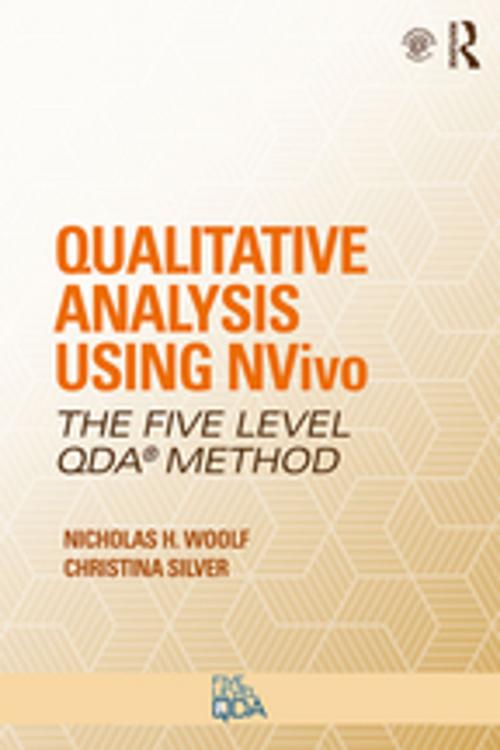Qualitative Analysis Using NVivo
The Five-Level QDA® Method
Nonfiction, Health & Well Being, Psychology, Research, Social & Cultural Studies, Social Science| Author: | Nicholas H. Woolf, Christina Silver | ISBN: | 9781351722858 |
| Publisher: | Taylor and Francis | Publication: | September 20, 2017 |
| Imprint: | Routledge | Language: | English |
| Author: | Nicholas H. Woolf, Christina Silver |
| ISBN: | 9781351722858 |
| Publisher: | Taylor and Francis |
| Publication: | September 20, 2017 |
| Imprint: | Routledge |
| Language: | English |
Software is cut and dried – every button you press has a predictable effect – but qualitative analysis is open ended and unfolds in unpredictable ways. This contradiction is best resolved by separating analytic strategies – what you plan to do – from software tactics – how you plan to do it. Expert NVivo users have unconsciously learned to do this. The Five-Level QDA® method unpacks the process so that you can learn it consciously and efficiently.
The first part of the book explains how the contradiction between analytic strategies and software tactics is reconciled by "translating" between them. The second part provides both an in-depth description of how NVivo works and comprehensive instruction in the five steps of "translation". These steps are illustrated with examples from a variety of research projects. The third part contains real-world qualitative research projects from a variety of disciplines, methodologies, and kinds of qualitative analysis, all illustrated in NVivo using the Five-Level QDA method. The book is accompanied by three sets of video demonstrations on the companion website.
The book and accompanying videos illustrate the Windows version of NVivo. As there are some differences in screen and interface design between the Mac and Windows versions please watch the video 'The NVivo Mac Interface' in the Component Orientation series of videos (available on the companion website).
The Five-Level QDA method is based on the authors’ combined 40 years of experience teaching NVivo and other software packages used as platforms for conducting qualitative analysis. After many years observing their students’ challenges they developed the Five-Level QDA method to describe the process that long-time NVivo experts unconsciously adopt. The Five-Level QDA method is independent of software program or methodology, and the principles apply to any type of qualitative project.
Please see the following URL to access the accompanying materials for this book: http://www.fivelevelqda.com/directory-intro
Software is cut and dried – every button you press has a predictable effect – but qualitative analysis is open ended and unfolds in unpredictable ways. This contradiction is best resolved by separating analytic strategies – what you plan to do – from software tactics – how you plan to do it. Expert NVivo users have unconsciously learned to do this. The Five-Level QDA® method unpacks the process so that you can learn it consciously and efficiently.
The first part of the book explains how the contradiction between analytic strategies and software tactics is reconciled by "translating" between them. The second part provides both an in-depth description of how NVivo works and comprehensive instruction in the five steps of "translation". These steps are illustrated with examples from a variety of research projects. The third part contains real-world qualitative research projects from a variety of disciplines, methodologies, and kinds of qualitative analysis, all illustrated in NVivo using the Five-Level QDA method. The book is accompanied by three sets of video demonstrations on the companion website.
The book and accompanying videos illustrate the Windows version of NVivo. As there are some differences in screen and interface design between the Mac and Windows versions please watch the video 'The NVivo Mac Interface' in the Component Orientation series of videos (available on the companion website).
The Five-Level QDA method is based on the authors’ combined 40 years of experience teaching NVivo and other software packages used as platforms for conducting qualitative analysis. After many years observing their students’ challenges they developed the Five-Level QDA method to describe the process that long-time NVivo experts unconsciously adopt. The Five-Level QDA method is independent of software program or methodology, and the principles apply to any type of qualitative project.
Please see the following URL to access the accompanying materials for this book: http://www.fivelevelqda.com/directory-intro















